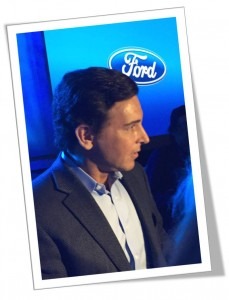The buzz out of Forecast last week surrounded CRN International Executive VP Dick Kalt’s comments about broadcasters and pure-plays. In Radio Ink, Kalt suggested that radio companies embrace and even partner with Pandora or Spotify to strengthen the audio marketing model.
While these comments might have been unthinkable just a couple of years ago, digital partnerships are becoming a major talking point in radio. They may not always work out as planned (think Rdio and Cumulus), but it’s clear that more and more broadcasters are looking over the fence at the disruptors in the audio ecosystem.
Part of this thinking comes from a more holistic understanding of who we’re competing against. After two days of DASH panels and conferences earlier this month, I can tell you that whether it’s over the battle for automotive revenue or the in-dash competition to win the driver’s commute time, radio is most definitely competing with digital disruptors.
And so are the automakers. DASH outlined the simultaneous dashboard invaders – Apple and Google – with their CarPlay and Android Auto platforms. We covered that disruption in a post last week accompanied by a compelling video that illustrated just how these new dashboard ecosystems work.
The automakers know that whether it’s Uber or Lyft, shared mobility, the battle for dashboard real estate, or the quest for data, Silicon Valley is a key source of the problem.
And the solution.
That’s because the automakers aren’t running away from the disruption – they’re driving right into it.

Mark Fields, CEO of Ford, is all about his company embracing many of these changes, from car sharing to mobile apps to self-driving cars. He sees the advent of autonomous cars coming sooner than many think, perhaps in four years time.
GM’s Mary Barra sounds like she’s reading out of the same playbook. In a recent LinkedIn article appropriately titled “How A Company Can Disrupt Itself – Before Others Do It First,” Barra talked about the need to move fast and recruit “disruptors” from Silicon Valley because they exude the right mix of innovation and passion.
 These auto CEOs are morphing the vision of their traditional corporations. And that should be inspirational to broadcasting’s leaders, often charged with the same tough task of guiding their businesses through the gauntlet of change.
These auto CEOs are morphing the vision of their traditional corporations. And that should be inspirational to broadcasting’s leaders, often charged with the same tough task of guiding their businesses through the gauntlet of change.
Here’s Mark Fields’ view on Ford:
“We are becoming a mobility company and an auto company.”
And Barra’s on GM:
“We’re disrupting our traditional business model, intensely focusing on redefining the future of personal mobility through everything from car-sharing – and the connectivity and user experience apps associated with it – commute-share, e-bikes, affordable EVs, autonomous vehicles and other mobility concepts we haven’t even invented yet. It’s all about being ambidextrous, too – managing our core business while proactively defining the future.”
Change is hard. Becoming victimized by disruption is much harder. One of the key goals of DASH is to expose broadcasters to the mindsets of automotive leaders.
One of the things we have gleaned from the last several years of spending time with automakers is how relentlessly positive they are that their companies will survive the transition. They may not all make it to the finish line, and clearly some of their strategies will fail.
But car execs clearly understand the competitive challenges and the changing consumer environment. And they’re not all reticent about calling it what it is, noting they simply have to change the way they do business if they’re going to remain relevant and profitable.
The radio industry – like the car companies – should feel a strong sense of pride about its accomplishments over the last many decades. Radio has become part of the fabric of people’s lives, providing a soundtrack of entertainment and information in cities and towns as widespread as Philadelphia to Paducah.
But admitting the change that’s in the air, and the need to redefine a company’s – or an entire industry’s – focus is also part of the process that tells managers and the rank and file that ownership gets it, and is prepared to do what it takes to make the transition.
That’s how you deal with and ultimately benefit from disruption.
- Can Radio Afford To Miss The Short Videos Boat? - April 22, 2025
- Media And Technology In 2025: Believe It Or Not! - April 18, 2025
- In Radio, You Just Never Know - April 17, 2025




Leave a Reply